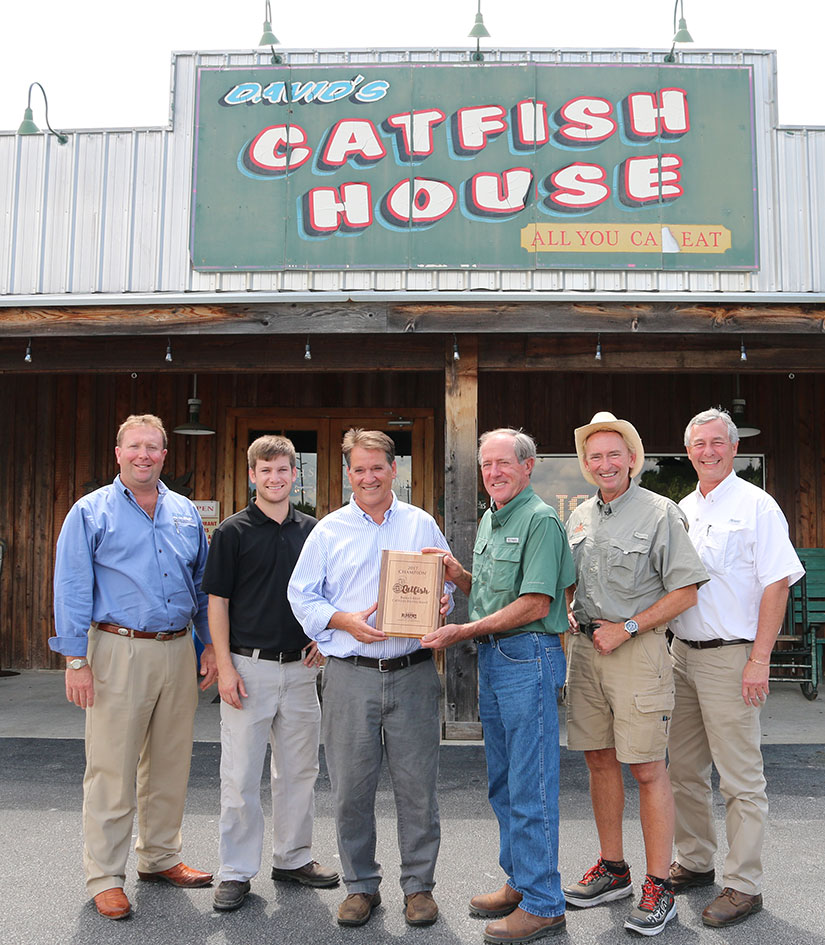
Alabama Farmers Federation officials confirmed Tuesday that David’s Catfish House of Atmore was selected by a three-member judging panel as the state’s best catfish restaurant.
The local restaurant was recently announced as one of four finalists from more than 250 nominations in the second annual Bama’s Best Catfish Restaurant Challenge, which was sponsored by Alabama Catfish Producers. The other finalists were Catfish N Que in Cullman, Orrville Farmer’s Market in Orrville and Swamp John’s in Red Bay.
David’s apparently most pleased the judging panel’s palates and was awarded a cash prize, a Bama’s Best Catfish plaque and a feature in the September issue of Alabama Farmers Federation’s monthly Neighbors magazine.
According to a press release issued by contest organizers, one of the deciding factors was the local restaurant’s specials, including catfish and grits topped with gumbo, which was popular with each of the judges. The trio also enjoyed baked, fried and lemon-broiled catfish during their taste test.
The local dining establishment was actually a double winner. This year’s contest also featured a People’s Choice Award that was determined by the amount of Facebook support each of the finalists generated. More than 2,750 customers voted during the July 11-19 period, and David’s got the most accolades.
The three judges – Townsend Kyser, president of Catfish Farmers of America; Alabama Farmers Federation’s Jim Allen, who hosts the “Simply Southern” television show; and Fred Hunter, host of the television show “Absolutely Alabama,” – came to Atmore last Friday (July 14) to sample the local eatery’s fare.
Alabama Catfish Producers Chairman Sid Nelson was also along, as were a videographer and farm federation officials Mitt Walker and Debra Davis. Nelson and the judges chatted quietly with David’s Catfish owner Rob Faircloth as servers hustled back and forth from the kitchen with trays of sizzling catfish entrees, sides and drinks.
Asked to reveal the secret to his success, Faircloth said his employees and the service they provide are the major factors.
“We have employees who have been with us for 25 or 30 years,” he said. “They’re happy and enjoy what they’re doing; they know our customers and want to make them happy. We can’t thank our customers enough for nominating us.”
The judges and their entourage traveled an estimated 1,000 miles over two days (July 13-14) to taste and weigh the merits of the finalists’ catfish-laden menus.
Faircloth, his son Elliott and business partner Terrence Breckinridge experienced a brief period of anxiety as they tried to decide what dishes the judges might prefer.
“Just put your best fish forward,” Davis answered, breaking the tension. “Bring them whatever you want them to taste, or bring them a sampler plate with a little bit of all your best.”
The contest was both a lead-up to National Catfish Month, which is observed in August, and a statewide promotion of one of the state’s fastest-growing industries, said Walker, who noted that Alabama trails only Mississippi in production of farm-raised catfish.
“We try to do a lot of promotions like this,” he said before applying his fork to a fried fillet. “We’ve got 17,000 acres of water in Alabama, and we raise about 125 million pounds a year. That’s about one-third of the national catfish production. The soil we have in Alabama, the climate, all those things have allowed the catfish industry to flourish.”
Davis said the contest was also a way to express the appreciation of aquiculturists for the dining establishments that serve home-grown catfish. She added that today’s commercially grown version is fattened on a special mixture that consists primarily of corn and soybeans.
“Most catfish is consumed in restaurants,” she said. “This is a way to thank the restaurant owners who serve U.S. farm-raised catfish and to encourage more people to consume the product. It is also a chance for these farmers to show the restaurant owners how much they appreciate them serving their product. They could possibly serve cheaper, imported catfish, but the taste and quality would not be the same.”
Hunter said he knew two things going into the contest. First, he wouldn’t have to look far to find great catfish; second, deciding which was best would be difficult.
“I was right about the great catfish,” he said. “Although there was only one winner, all of them were fantastic. I can’t wait to go back to any or all of them again.”
